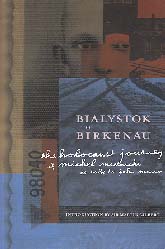|
________________
CM . . . .
Volume VII Number 13 . . . . March 2, 2001
excerpt: "On the side, you dirty Jew": words forever seared in my brain by SS Unterscharfuehrer Heinrich Kuhnemann, as he tore my father from me with the crook of his cane in a "selection" of those to be immediately gassed and burned. When last I saw him beside the dark and fetid freight car that had transported us in a surreal world of searchlights, high-voltage fences, snarling German wolfhounds, and their black-shirted masters Chaim Mielnicki was but forty-seven years of age. And I have never recovered from his loss.Many adolescents have read and been moved by The Diary of Anne Frank, but this young girl was certainly by no means the only Jewish juvenile to die in the German concentration camps of World War II. All school and public library collections which hold Anne's book should also add Mielnicki's Bialystok to Birkenau for it presents another adolescent's perspective on this horrific period, but one with a slightly more upbeat ending for Michel Mielnicki is a holocaust survivor, one who eventually emigrated to Canada where he enjoyed a successful career as a fashion designer. The book is divided into four parts. In the first, "My Father's Son," Michel provides readers with some historical background regarding the status of Jews in Catholic Poland in the decades prior to the war. He personalizes this portion by telling the story of his parents' lives in Poland and by showing how their religious/cultural heritage was always an obstacle to their full participation in Polish society. Born on March 20, 1927, Michel also shares his own ups and downs growing up as a Jewish child in the anti-Semitic atmosphere of Wasilkow, a Polish village near the larger community of Bialystok. "Days of Bliss and Horror" deals with the period following the first German invasion of Poland, the country's partition under the terms of the 1939 German-Soviet Nonaggression Pact whereby Michel's area of Poland fell under Soviet control, and the June 22, 1941 German attack on the Soviet Union after which all of Poland again was under German control. The "bliss" portion was essentially the time under Soviet control where, in relative terms, the Jewish population was well treated. However, following the second German invasion, Michel's family became inhabitants of the Jewish ghetto in Bialystok until mid-December,1942, when they were transported to a German "labour" camp. The book's longest section, "Freedom Through Work," (which is an English translation of the ironic "motto" found above the gates of Auschwitz) follows Michel who, at just 14, entered Auschwitz-Birkenau. For the next four years, through luck, shrewdness and guile, Michel would manage to survive. One of the strengths of Michel's writing is that he does not do what his captors had done to him, that is, to characterize everyone in a group as being the same. Amid the terrible conditions in the various camps to which Michel was sent, he does identify the "better" of his warders and fellow prisoners. During the final period of Michel's confinement and with the help of some Russian POW's, he survived by passing himself off as Misha, a Russian gentile. The concluding portion, "Survivor," initially finds Michel/Misha still a German prisoner, but now as a "Russian" POW working outside the death camps. His final liberation occurs on April 15, 1945, but then Michel's holocaust journey becomes one of returning to Poland to see if any of his family survived. Amazingly, he finds Jews still being killed by Polish Christians. The "Epilogue and Afterword," written by John Munro, updates readers on what has happened to Michel and his surviving siblings in the years since 1946. More than a Holocaust survivor, Michel Mielnicki is a Holocaust "witness," and, as such, he powerfully testifies to what occurred so that the generations which follow might know and learn not to replicate such horrors. More than a half century after this genocidal event, it is perhaps too easy for some simply to assign it to "history," but Michel Mielnicki's personal account should remind readers that the event is still alive for those who were unwilling participants, and it painfully lives on for the millions who lost friends and relatives. Scattered throughout the text are numerous black and white family photos, plus pictures of the death camps and their "operators," which further concretize Michel's testimony. Highly Recommended. Dave Jenkinson teaches courses in YA literature in the Faculty of Education, University of Manitoba.
To comment on this title or this review, send mail to cm@umanitoba.ca.
Copyright © the Manitoba Library Association.
Reproduction for personal use is permitted only if this copyright notice
is maintained. Any other reproduction is prohibited without
permission.
Published by
TABLE OF CONTENTS FOR THIS ISSUE - March 2, 2001.
AUTHORS |
TITLES |
MEDIA REVIEWS |
PROFILES |
BACK ISSUES |
SEARCH |
ORDER |
CMARCHIVE |
HOME
|
